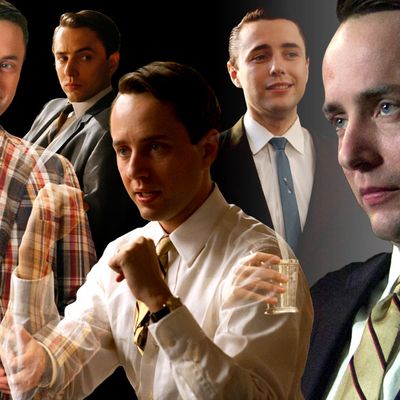
Pete Campbell sure can take a punch, and Mad Men seems to relish chances to bop him in his smug babyface. He’s a liar and a cheater, he tries to control people, and he keeps secrets and has secrets. Pete copies Don Draper’s moves at every turn, and yet he’s the show’s villain and Don is its (anti)hero. Don is cool and Pete is not. Poor Pete. Poor, punchable Pete.
On this week’s season finale, Pete begged his mistress to run away with him, and she looked at him with shimmering sad eyes and deflected the offer. It was a pathetic display on Pete’s part, and his weird love proclamation seemed both premature (they barely know each other) and immature (that’s a little-boy way of thinking about romance). It also seemed a lot like when Don fled to his mistress’s arms and begged her to run away with him, in exactly the same fashion. In “Nixon vs. Kennedy,” Rachel Menken takes Don’s proposition as an insult. “You don’t want to run away with me,” she says, “you just want to run away.” Beth is Pete’s Rachel Menken — a symbol of who he didn’t become, but someone he thinks he’s like. Pete’s drawn to Beth’s sadness because he thinks it’s like his own, just as Don’s drawn to Rachel’s sense of alienation, because he thinks they have that in common. But Beth isn’t suffering from suburban ennui like Pete thinks, and Rachel tells Don that she’s “not that Jewish.” The men don’t really see these women. They see themselves in these women.
Pete and Don share a true love, though, in Peggy. Pete’s the creep, the one who seduced her and treated her cruelly, impregnated her, tried to get her back, the one who keeps her at arm’s length. Don’s the one who mentored her, supported her, was there for her when she was in the hospital; he confides in her. Except that’s not the only way to describe it. Pete’s the one who said, “I wish I’d picked you then. I love you.” The one who told Peggy that she’s “perfect.” Don’s the one who makes drunken demands, the one Peggy cleans vomit off of, the one who yells at her until it seems like she’s crying. Don only promoted Peggy in the first place to spite Pete. Peggy is the audience’s stand-in — the pilot is set on her first day of work, and we learn about these characters the way she does, and we trust her judgement. She’s a prism, refracting Don’s behavior so it looks more forgivable, refracting Pete’s so it seems more abhorrent.
The adultery, the womanizing, the ability to tell people what they want to hear — Pete and Don are swimming in the same waters. “You don’t want me to have what I want,” Pete says petulantly to Trudy in season one’s “5G.” In this season’s “The Little Kiss,” Don tells Megan, “I just wanted you to have what you want.” Pete’s sounds like a putdown and Don’s sounds like a kindness, but that’s not quite it: Pete actually cares about what Trudy wants (well, he did at that point), and, perhaps naively, he wants his ambitions and hers to be synonymous. Don bought Megan a white carpet — even though he knew it was an impractical idea — because he just didn’t care one way or the other. “Whatever” is not more kind than “no,” it’s just more conflict-avoidant.
Neither man is well-suited to intimacy or tenderness because they share a similarly painful, loveless background. Pete grew up a Wasp in tennis whites and denial, and Don grew up on a farm fantasizing about the hobo code, but a lack of affection knows no economic bounds. Pete hates his parents, is unmoved by his father’s death, and has a brother whom his folks treated completely differently. Same goes for Don. That primary absence of familial love and stability haunts the men into adulthood, souring their relationships, convincing them they don’t really deserve happiness, and making aspects of their current lives seemingly invisible. “You have everything, and so much of it,” Peggy tells Don in season three’s “The Fog.” But Don can’t see a shred of it. “I have nothing, Don,” a defeated Pete confessed in this season’s “Signal 30.” That’s more like it.
And yet Pete is Pete, and Don is Don, and Pete is wimpy and Don is stoic. Don moves through the world with a rare kind of panache — and it’s not just Pete who can’t live up to that standard. The fundamental difference between the two goes deeper than that, though, and it’s that Don is driven where Pete feels entitled. Both characters’ lives change after they’re mistaken for “Don Draper.” The Don we know created that moment by seizing dog tags and never correcting anyone. For Pete to be incorrectly identified, all he had to do was sit there, and a mailroom courier just handed him a package. Dick decided to be Don, but it just sort of happened to Pete. And that’s how each of them sees the world: Don thinks it’s something to be seized, while Pete knows his biggest moments only happen when other people make mistakes.

